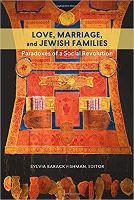


|
|
|
books
| book details |
Love, Marriage, and Jewish Families
Edited by Sylvia Barack Fishman

|
This book is currently unavailable. Enquire to check if we can source a used copy
|
| book description |
The concepts of gender, love, and family - as well as the personal choices regarding gender-role construction, sexual and romantic liaisons, and family formation - have become more fluid under a society-wide softening of boundaries, hierarchies, and protocols. Sylvia Barack Fishman gathers the work of social historians and legal scholars who study transformations in the intimate realms of partnering and family construction among Jews. Following a substantive introduction, the volume casts a broad net. Chapters explore the current situation in both the United States and Israel, attending to what once were considered unconventional household arrangements - including extended singlehood, cohabitating couples, single Jewish mothers, and GLBTQ families - along with the legal ramifications and religious backlash. Together, these essays demonstrate how changes in the understanding of male and female roles and expectations over the past few decades have contributed to a social revolution with profound - and paradoxical - effects on partnering, marriage, and family formation. This diverse anthology - with chapters focusing on demography, ethnography, and legal texts - will interest scholars and students in Jewish studies, women's and gender studies, Israel studies, and American Jewish history, sociology, and culture.
| product details |
Normally shipped |
Publisher | Brandeis University Press
Published date | 2 Feb 2016
Language |
Format | Hardback
Pages | 360
Dimensions | 0 x 0 x 0mm (L x W x H)
Weight | 0g
ISBN | 978-1-6116-8859-7
Readership Age |
BISAC | social science / jewish studies
| other options |
|
|
|
To view the items in your trolley please sign in.
| sign in |
|
|
|
| specials |
|
|

|
Mason Coile
Paperback / softback
224 pages
was: R 542.95
now: R 488.95
|
A terrifying locked-room mystery set in a remote outpost on Mars.
|
An epic love story with the pulse of a thriller that asks: what would you risk for a second chance at first love?
|
|
|
|
|